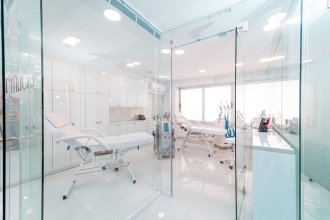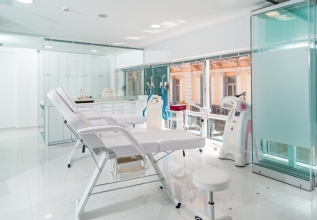DISCOVER OUR IDENTITY
Who we Are
The Beginning
It was July 1995 when the founder of HOMED, Dr. Ilias Papazisis, received a phone call for intravenous treatment to a cancer patient.
This was preceded by five years of intensive studies for the creation of a very innovative model of primary care health services. The concept of home health care was a part of this model.

However, no decision had been made for its implementation.
That phone call triggered a long, rapid, and still ongoing creative journey.
The First Company
The TELEIATRIKI Ltd was founded in July 1995 to provide hospital-level home care.
The patient’s room turned into a virtual hospital ward.
Doctors visited the patient daily and nurses more than twice a day. The whole team was always prompt for emergency visits day and night upon request. Blood tests, X-rays, and ultrasounds with portable devices completed the diagnostic arsenal. (Video)
The slogan:
“almost any patient who doesn’t need surgery or intensive care can be safely hospitalized at home”
became a flag and guide for future developments.
Acquisition by HYGEIA hospital
Initially, the home hospital care model sparked curiosity in the medical community. Then, this curiosity turned into interest. The interest led to acquisition offers for TELEIATRIKI Ltd.
Finally, in 2000, the proposal by HYGEIA Hospital prevailed to integrate the service as a department of the hospital.

The Home Care Department of HYGEIA Hospital was created.
Patents
From 2000 to 2007, the Hospitalization at Home model saw rapid development.
One key feature was the creation of prototype software for quality control.
At the same time, there was also the invention of a series of medical devices. All of these devices received international patents.Award from the European Union
The Home Care Department was honored by the European Union.
It was recognized as one of the best services in Europe for using advanced information and telecommunications technology (e-Europe Awards).
International Recognition
Soon, the Home Hospital Care model attracted international interest.
In 2004, the medical community in Australia recognized the importance and innovation of this system.
The Greek model was the main topic at the National “Hospital-in-the Home” Conference that year. The founder, Dr. Papazisis, was invited to present and elaborate on it.
The description of the model was included in the book e-Health by IOS Press, titled “Advanced Technology Permits the Provision of Advanced Hospital Care in the Patients’ Homes” (E. Papazisis, E-Health, IOS Press 2005, pp. 190-200).
In 2007, the Home Hospital Care activity became independent from the Hygeia Hospital. Then, the company HOMED was founded.
In 2013, HOMED was invited by the Government of Kuwait to assist with its expertise in developing an advanced home nursing system. The system mainly focused on caring for victims of the Gulf War.
In 2014, the Australian Medical Community highlighted this pioneering system for the second time.
They made it the main topic of their annual conference titled “Very Acute Hospital in the Home”. The Minister of Health for New South Wales introduced the presentation. She emphasized that this system could play a significant role in future global healthcare systems.
Present
Now, HOMED’s central Athens headquarters focuses on tourist healthcare, collaborating with insurance companies and working with a private hospital.
Its team manages patient hospitalizations and emergency transfers.
Our clinic HOMED stands out for its rapid emergency response. Quick medical team arrivals and efficient patient transport often lead to better health outcomes.
Finally, continuous positive patient feedback on Google reviews reflects the high quality of HOMED’s services.
Foundation of the IRITEL Organization
HOMED initiated the founding of the international organization IRITEL (International Research Institute for Telemedicine).
IRITEL is a non-profit, humanitarian organization. Its purpose is to help people living in poverty or in areas with poor access to health services. It also aims to develop standard services using advanced information technology and telecommunications.
Humanitarian Missions
IRITEL, with support from HOMED, has organized a series of medical humanitarian missions.
During these missions, medical services were provided to residents of isolated small islands during the winter months. In these periods, people have poor access to health services, and sea transport of patients is very difficult and dangerous.
Educational Activities
IRITEL is engaged in a series of educational activities to fulfill its goals.
Three National Conferences in Athens and one international conference in Dubai have been organized.
Educational seminars took place in various cities across Greece, and training sessions for small groups are regularly held at HOMED clinics. These trainings mainly focus on difficult venipuncture, wound suturing, interpreting electrocardiograms, and other techniques.
Initiated by HOMED, IRITEL is organizing an innovative conference, titled InnHealth to be held in April 2024.
This annual and national conference targets the world of tourist accommodations. The main topics will cover health risks often encountered in hotels. These include communicable diseases (like COVID-19), accidents, reptiles and insects, foodborne infections, and more.
Social Contribution and Action
HOMED, with a deep sense of social responsibility, supports vulnerable individuals and social groups needing protection.
As part of these activities, it fully funded the publication of the book “The Development of the Blind Child”.
This book now graces the libraries of all Greek Universities. It is a valuable tool for all professionals involved in the care and education of blind children.
HOMED supports “The Smile of the Child” and homeless people in need in central Athens.


